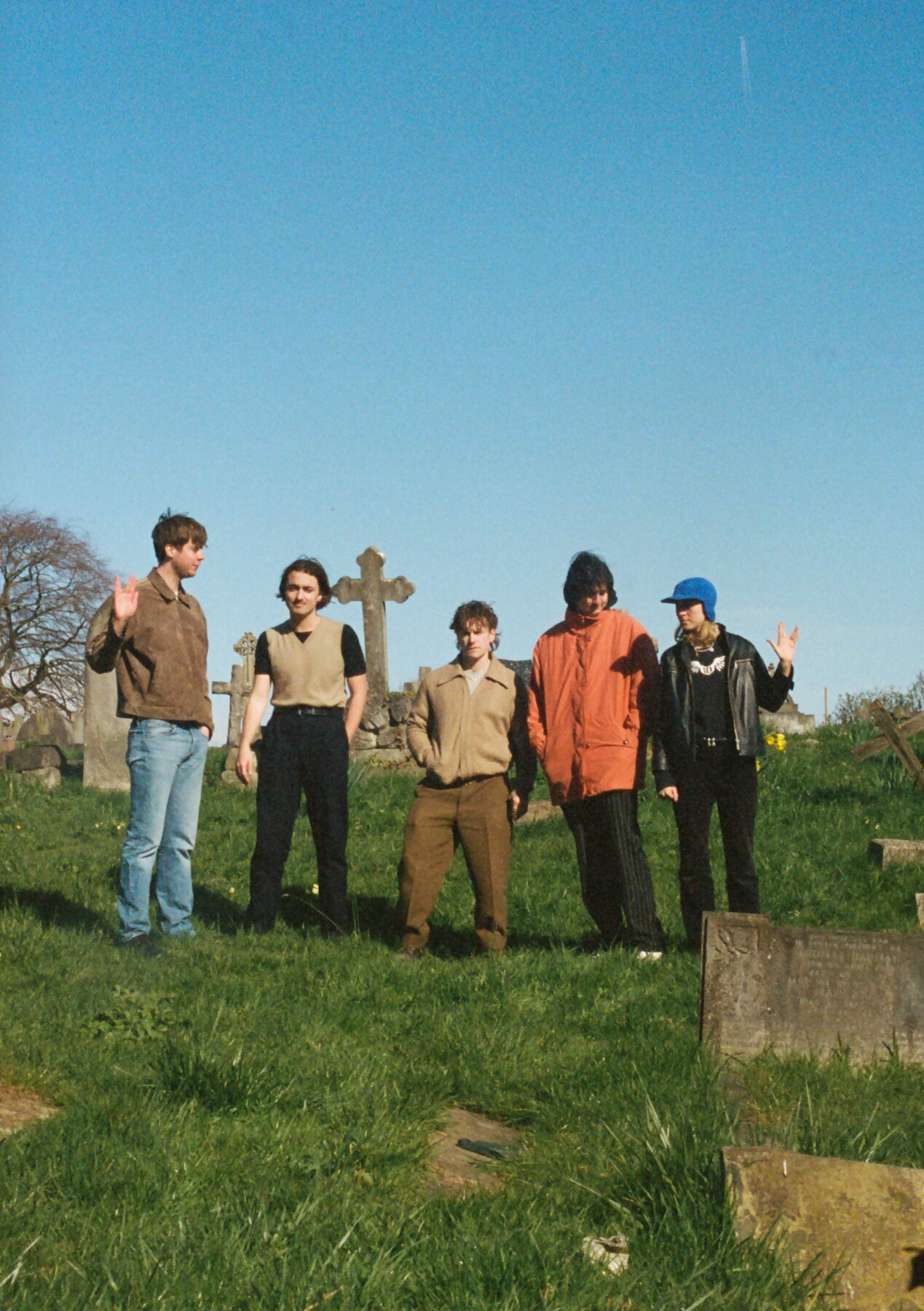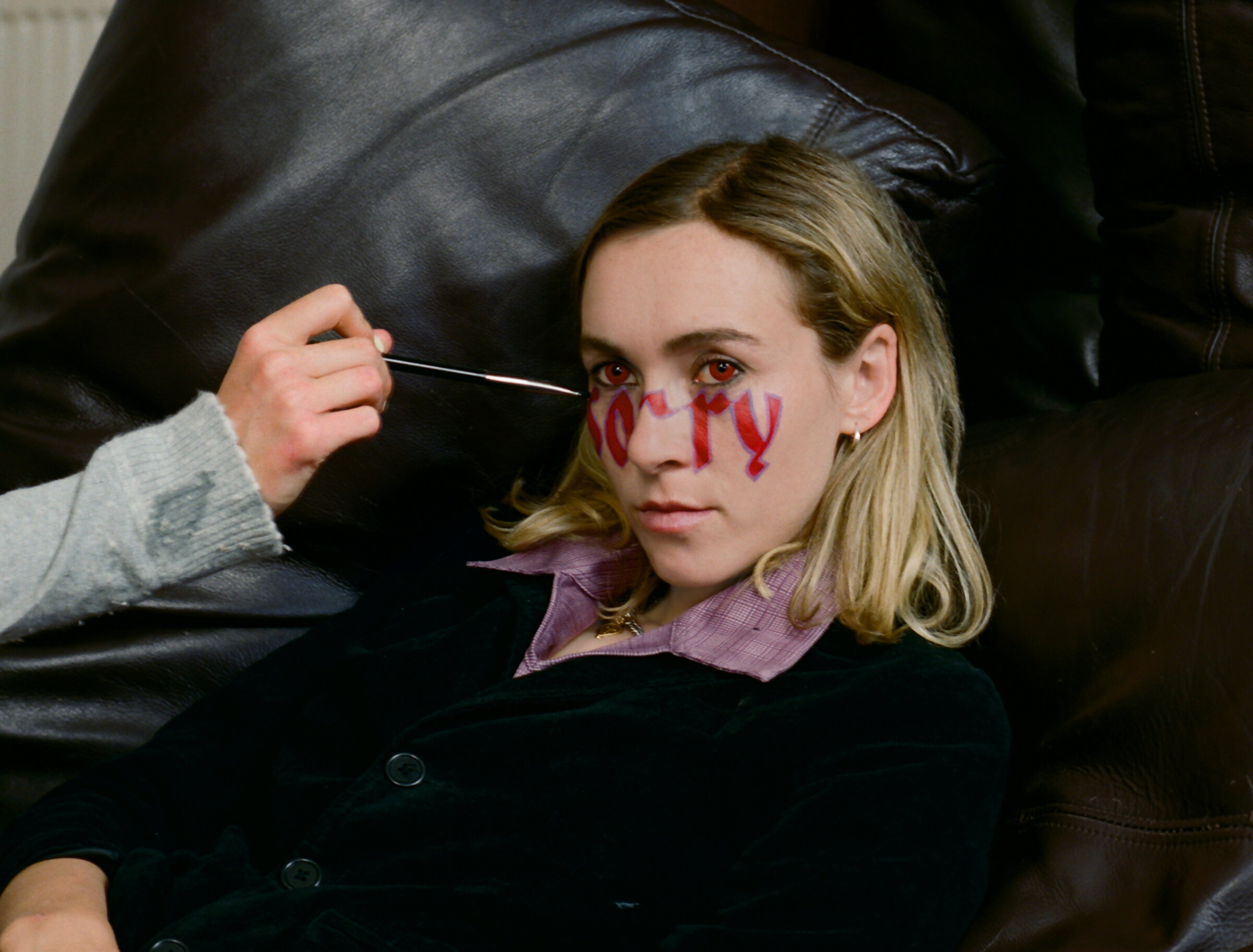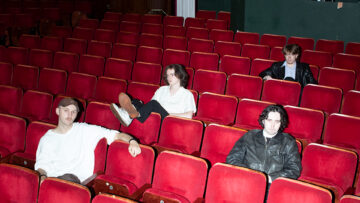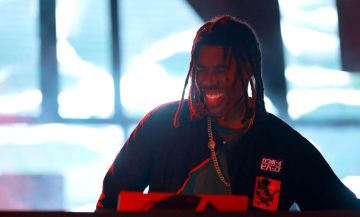
“It feels like we’re redoing our debut album process a bit,” Louis O’Bryen, whose songwriting partnership with Asha Lorenz comprises North London’s Sorry, tells me over the phone. “Being able to actually play to people since the album’s come out has just felt really rewarding”.
It’s two days after the band’s headline gig at Electric Brixton when we speak, and O’Bryen is sinking in a brief moment of calm between tours. “Obviously with our first album we didn’t get to tour it at all, we just kind of sat in our bedrooms and read articles online about it,” he reflects, referring to their debut album 925, released during the onset of the pandemic.
The band recently released their second album Anywhere But Here. Melding fantastical imagery and neurotic narratives, the record explores escapism, with its themes of love, grief and ultimately acceptance threaded together by glimpses into Sorry’s trademark humour.
Genre-wise, it’s hard to pin down, and this feels far from necessary. “It’s definitely not something we think about when we’re writing songs,” O’Bryen responds when asked about their relationship with genre, “we don’t think, ‘Oh this song is too folky or something. We just allow it to come out and then people call it a genre afterwards.”

Photo: Iris Luz
Able to play live this time around, Sorry are entirely in their element and making up for any lost time. “That’s really the best way of testing which songs people have connected most to,” O’Bryen says. “There was this one kid in Brighton who came with his Mum and he was so sweet and enthusiastic,” he adds.
“Before our album release, we did little easter egg things; we had a billboard up and we got people to go and take a picture with it and then they got a ticket to this secret gig we did. This kid did all of the little things but couldn’t go to any of the shows because he was under 18, so he was so excited to finally be able to see us. Stuff like that is just really surreal and sweet but also crazy.”
O’Bryen and Lorenz’s friendship formed during high school, and, one moniker down (Fish), three band members later (Lincoln Barrett, Campbell Baum, and Marco Pini), their DIY roots have branched out, with Anywhere But Here introducing a more expansive world. In some ways, it feels like an ode to navigating your early 20s and a second coming-of-age.
“I think with our first album it had that giddy youthfulness. You kind of can’t maturely access your emotions, so we were dancing around them a little bit by being tongue-in-cheek,” says O’Bryen. “It’s easier as you get older to wear your heart on your sleeve, be more forthcoming, and maturer about it. I think that influenced the songs a lot: being honest and sincere.”

Photo: Iris Luz
It’s not necessarily an easy process. The album is far more intimate, be it the yearning in ‘I Miss The Fool’ or cries of “I love you” in ‘Let The Lights On’. The writing process forced the pair to sit with their emotions. “I feel like maybe the daunting bit of it is writing the song just for yourself, reaccessing that emotion or whatever you’re writing about, but I think once it’s done you can just put it away a bit. Also, you get a bit of poetic licence so you can be a little flamboyant,” laughs O’Bryen.
“I think naturally, as you get older, you get more comfortable with yourself and I feel like in your early 20s you’re still shaking off that teenage awkwardness. I think by the time you’re in your mid-20s, which is how old we are now, you’ve shaken all of that off and naturally you feel a bit more sincere and mature,” he adds.
“During Covid, you weren’t really having those experiences, so I feel like it was hard to grow a bit during that phase. I think it came a lot easier afterwards. I think it’s something that happens to everyone. And because we’re in a band, it’s put out into the world through our songs, so it’s got a bit more of a magnifying lens on it.”
Last summer, the band went to Bristol to work with Ali Chant along with Portishead’s Adrian Utley on their sophomore record. Written primarily over lockdown, they spent a month and a half recording in southwest England, “hunkering down” to record and write its final tracks; “Let The Lights on” and “Key To The City” emerging from this period.

Photo: Peter Eason Daniels
“Portishead were one of our references for when we demoed the whole thing for what we wanted it to sound like, so it was super inspiring. They helped us make it into one succinct thing,” says O’Bryen. “Both [Utley & Chant] of them together just helped us make it really sound like one project.”
“I think with our first album – not that it was a bad thing – but we had a tendency to jump around. It was a little manic with the sound. They helped calm us down and make it sound like one world.”
The second album served to be both a challenge and a learning curve. “With the first, you go into it completely blind. You’re only thinking about what you, or maybe your friends or whoever listens to it may think; not like all these fans and the world basically,” he tells me.
“I think trying to ignore that aspect of it was super difficult and quite overwhelming at points. But we got through it. And it was useful learning how to not put other people’s opinions into the songs that much.” When I ask if he hopes listeners will have any particular takeaway, the answer, much like the album, is fluid. “Whatever people want to take away from it they can; we like to leave it up to everyone else to have their own views and take away what they want from that.”
Anywhere But Here was released via Domino, who O’Bryen tells me the band have been with for “five or six” years. Home to artists such as Alex G and Richard Dawson, it’s been a supportive home for Sorry to grow from.
When we discuss their approach toward genre, or lack thereof, O’Bryen assures me the label is open: “They don’t care as long as the song’s good, that’s the most important thing,” he says, then hesitates. “I mean, they might get angry if we wrote an electro swing song or something.”
Despite finding themselves in the music industry from a young age, Sorry have grown to find what works for them. “I thought it was quite funny,” he says of the experience. “We were around 18, just playing gigs and drinking beers and stuff. At that age, you’re a bit cocky and just do whatever you want to a certain extent, so it was fun.”
Around this time, the band’s profile had begun to rise in a bubble loosely circulated around The Windmill, a Brixton stalwart. A string of bands such as Black Midi, Shame and Goat Girl made up this landscape, woven together by their music, friendship and shared DIY ethos. Over lockdown, Sorry released a live album to support the formative independent venue, and it was here that the first playback for Anywhere But Here took place.

Photo: Iris Luz
London has been integral to the band. You can hear it in the sound; it’s who they are as people. “I think you grow up a lot quicker when you grow up in London, you’re exposed to a lot of different things earlier on, it’s definitely intense,” O’Bryen tells me, “But it’s all I know.” It’s shifting too, and its surroundings are ever-changing.
“We played at Electric Brixton the other night, and we walked around Brixton Village,” says O’Bryen, “I’d never seen it before, the village which they’ve done up, and that place is pretty sad. It’s such an integral part of London and they’ve completely ripped out its soul – it’s so over-gentrified. And Camden as well. Me and Asha and all of our friends grew up going to Camden, and it’s now basically like you can’t go there anymore. It’s really sad.”




